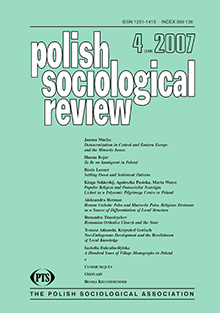Neo-Endogenous Development and the Revalidation of Local Knowledge
Neo-Endogenous Development and the Revalidation of Local Knowledge
Author(s): Krzysztof Gorlach, Tomasz AdamskiSubject(s): Social Sciences
Published by: Polskie Towarzystwo Socjologiczne
Keywords: expert knowledge; local knowledge; neo-endogenous development; rural communities
Summary/Abstract: This article is about rural development. This theoretical concept encompasses the perspective of neo-endogenous development, i.e., a developmental idea rooted in the assumption that two different types of resources should be utilised side by side: internal resources, unique for a particular community, and external resources, offered by the state, non-governmental organisations and supranational institutions and organisations. The combination of two major types of knowledge plays an important role in this mechanism: so-called external, expert knowledge contributed by experts and representatives of the said institutions and local knowledge, contributed by members of the local community and based on experience and tradition. The main idea of the article is that only the combination of both types of knowledge will guarantee success, i.e., specific change. This process is empirically illustrated by a case study of the reintroduction of the “Polish red cow” in one of the local administrative districts of the Małopolska voivodeship. This study was conducted in 2005 by a group of sociologists from the Jagiellonian and Łódź Universities within the framework of the CORASON Project (A Cognitive Approach Towards Rural Sustainable Development), part of the European Union Sixth Framework Programme.
Journal: Polish Sociological Review
- Issue Year: 160/2007
- Issue No: 4
- Page Range: 481-497
- Page Count: 16
- Language: English

